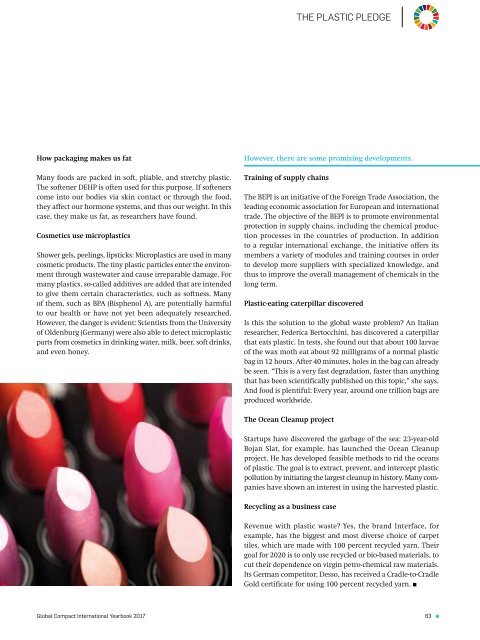Global Compact International Yearbook 2017
Sustainability in Troubled Times We life in times of uncertainty and global (dis)Order. „Understanding global mega-trends is crucial. We live in times of multiple, evolving and mutually-reinforcing shifts“, says UN Secretary-General António Guterres. He adds: „These dynamics, of geopolitical, demographic, climatic, technological, social and economic nature, enhance threats and opportunities on an unprecedented scale.“ Therefore sustainability in troubled times is the key topic of the Global Compact International Yearbook 2017, edited by macondo publishing.
Sustainability in Troubled Times
We life in times of uncertainty and global (dis)Order. „Understanding global mega-trends is crucial. We live in times of multiple, evolving and mutually-reinforcing shifts“, says UN Secretary-General António Guterres. He adds: „These dynamics, of geopolitical, demographic, climatic, technological, social and economic nature, enhance threats and opportunities on an unprecedented scale.“ Therefore
sustainability in troubled times is the key topic of the Global Compact International Yearbook 2017, edited by macondo publishing.
Create successful ePaper yourself
Turn your PDF publications into a flip-book with our unique Google optimized e-Paper software.
THE PLASTIC PLEDGE<br />
How packaging makes us fat<br />
Many foods are packed in soft, pliable, and stretchy plastic.<br />
The softener DEHP is often used for this purpose. If softeners<br />
come into our bodies via skin contact or through the food,<br />
they affect our hormone systems, and thus our weight. In this<br />
case, they make us fat, as researchers have found.<br />
Cosmetics use microplastics<br />
Shower gels, peelings, lipsticks: Microplastics are used in many<br />
cosmetic products. The tiny plastic particles enter the environment<br />
through wastewater and cause irreparable damage. For<br />
many plastics, so-called additives are added that are intended<br />
to give them certain characteristics, such as softness. Many<br />
of them, such as BPA (Bisphenol A), are potentially harmful<br />
to our health or have not yet been adequately researched.<br />
However, the danger is evident: Scientists from the University<br />
of Oldenburg (Germany) were also able to detect microplastic<br />
parts from cosmetics in drinking water, milk, beer, soft drinks,<br />
and even honey.<br />
However, there are some promising developments.<br />
Training of supply chains<br />
The BEPI is an initiative of the Foreign Trade Association, the<br />
leading economic association for European and international<br />
trade. The objective of the BEPI is to promote environmental<br />
protection in supply chains, including the chemical production<br />
processes in the countries of production. In addition<br />
to a regular international exchange, the initiative offers its<br />
members a variety of modules and training courses in order<br />
to develop more suppliers with specialized knowledge, and<br />
thus to improve the overall management of chemicals in the<br />
long term.<br />
Plastic-eating caterpillar discovered<br />
Is this the solution to the global waste problem? An Italian<br />
researcher, Federica Bertocchini, has discovered a caterpillar<br />
that eats plastic. In tests, she found out that about 100 larvae<br />
of the wax moth eat about 92 milligrams of a normal plastic<br />
bag in 12 hours. After 40 minutes, holes in the bag can already<br />
be seen. “This is a very fast degradation, faster than anything<br />
that has been scientifically published on this topic,” she says.<br />
And food is plentiful: Every year, around one trillion bags are<br />
produced worldwide.<br />
The Ocean Cleanup project<br />
Startups have discovered the garbage of the sea: 23-year-old<br />
Bojan Slat, for example, has launched the Ocean Cleanup<br />
project. He has developed feasible methods to rid the oceans<br />
of plastic. The goal is to extract, prevent, and intercept plastic<br />
pollution by initiating the largest cleanup in history. Many companies<br />
have shown an interest in using the harvested plastic.<br />
Recycling as a business case<br />
Revenue with plastic waste? Yes, the brand Interface, for<br />
example, has the biggest and most diverse choice of carpet<br />
tiles, which are made with 100 percent recycled yarn. Their<br />
goal for 2020 is to only use recycled or bio-based materials, to<br />
cut their dependence on virgin petro-chemical raw materials.<br />
Its German competitor, Desso, has received a Cradle-to-Cradle<br />
Gold certificate for using 100 percent recycled yarn.<br />
<strong>Global</strong> <strong>Compact</strong> <strong>International</strong> <strong>Yearbook</strong> <strong>2017</strong> 63

















